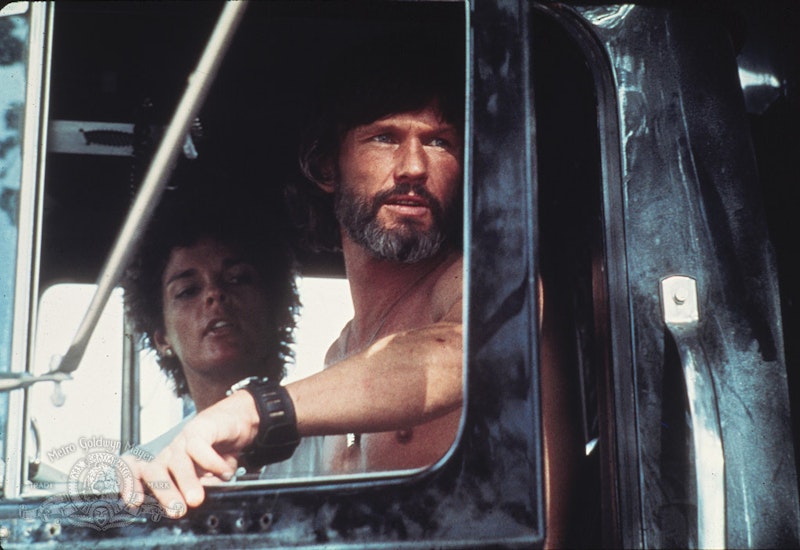There will never be another Kris Kristofferson. Actor, musician, outlaw—Kristofferson was a capital-A American, a man whose charisma and brilliance kept the establishment from being able to really shake off one of country music’s most left-wing stars. Kristofferson’s generation of songwriters were the last of their kind, the last time that country music had a popular appeal in bringing people together and standing up for themselves rather than jingoistic nationalism. My friend Chris always cites Korean Air Lines 007 going down in ‘83 and inspiring Lee Greenwood to “God Bless the U.S.A.” and turning country music into a sycophantic joke of an industry, selling people who own used car dealerships the idea that they’re the real Americans, a genre that would transform into the same kind of conservative schlock that can only reproduce images of rebellion against perceived establishments from some imaginary land (the mythic West, a world out of time and reality), because if they confronted the truth they’d realize that they are the establishment, the wealthy landed individuals that any true down-and-out highwayman or rambler would hate. Somehow, outlaw country gave way to cop music. Kristofferson never sat down, but his popularity didn’t get any favors when Heaven’s Gate (1980) bombed and any semblance of leftism in country or western media became completely taboo in Reagan’s years of fascism-with-a-smile.
RUBBER DUCK: “You’re gonna be one of us pretty soon, you know?”
DIRTY LYLE: “How’s that?”
RUBBER DUCK: “Ain’t ya heard? The Teamsters are gonna be organizing the cops.”
DIRTY LYLE: “Not this one. I don’t want no part of your damn union.”
RUBBER DUCK: “Ain’t my damn union, Lyle. I’m independent, don’t you remember?”
DIRTY LYLE: “I guess we got one thing in common.”
RUBBER DUCK: “Two. There ain’t many of us left.”
This exchange in Convoy, Sam Peckinpah’s 1978 film based on a novelty song of the same name (which also has to be one the most radical filmic adaptations of a novelty song), is between the free-spirited, rebel-without-a-cause truck Rubber Duck (Kristofferson) and the no-good, mean and dirty Sheriff Lyle (played typically seedily by Ernest Borgnine), offers a surprising glimpse into the future that no one involved with the film could’ve known at the time. The cops got organized—now their unions terrorize cities across America, giving pigs more power and impunity than they ever had. Hard times came for the traditional Teamsters, too—the 1980s weren’t too nice to workers’ movements, and the trucking industry has mostly been stripped of the good union jobs and replaced with freelancers indentured in servitude to their debts. An independent man like Duck was a dying breed, if he were to truck he’d be broke riding around dying highways in a world where the road’s no longer the path to solidarity but a dead-end of resentment.
Back in the 1970s, it was obvious that the government was evil, that it was selling its people for profits. After the Cold War, the new neoliberal world order tried to pretend that everything was getting better, that history had ended, and its arc had bent towards justice. That’s a lie and against that backdrop the world’s slipping into conservative nihilism—the Dems are handling Hurricane Helene no better than the Republicans did Katrina, and the ostensibly progressive coup in the Teamsters by Sean O’Brien against Hoffa’s kid has dropped that once radical and powerful union into complete ambivalence as the once Dem stronghold brotherhood refused to endorse a candidate after members were polled and a majority turned out to be supporting Trump.
It’s not as if that man, or any Republican, is a friend to any worker, but people want to bring down the system that’s making their lives get worse and worse, and the hucksters are selling them a mytho-American-Christian-ultranationalist image of a country that never existed. And people are buying the snake oil, and now guffawing upper-middle class suburban types are aligning themselves with the panic-inducing news headlines of yesterday, because they see the likes of the Hells Angels skinhead gangs as shock troops against the “liberals.” Perhaps we should’ve listened to Hunter S. Thompson, when he presciently pointed out that biker gangs were never in a real war with the start, but an arm of state oppression itself, playing a simulated war with the cops when both sides of the conflict are just a bunch of jack-booted white-nationalist neo-Nazis.
Convoy is an equally mythic image of America, of one that never existed because it isn’t real, but an aspiration towards an ideal. When Duck and his trucking comrades get into a scrap with the cops and get on the run, the word goes out over the short wave, and the people of ham radio alt-America start joining in, building a Rainbow Coalition on the road. The police try to stop them at first in the name of public order, but once they start cutting through towns it becomes clear that the outlaws are more popular than the politicians. Convoy isn’t the road to annihilation that Two-Lane Blacktop (1971) rides across, or the lonesome last challenger in Vanishing Point (1971), but an almost utopian vision that if the rebels start to call, the weirdos will rise up together, and people of all stripes will hold hands and sing like a diesel engine. When an official from New Mexico rides alongside them trying to get an idea of what this is all about—are they protesting something?—the answers are as varied as the people running the road. It’s not such a specific cause that is driving them, but a feeling—an antidote to conservative nihilism that plagued America then and plagues it now, Kristofferson’s Duck tells the men, “The point is to keep moving.”

